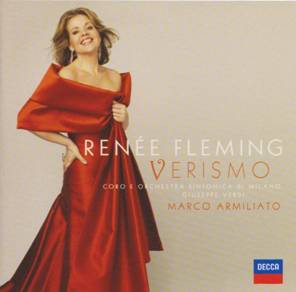Untitled Document
Renee Fleming: Verismo

What scorn is nowadays heaped on some operatic forums on poor Renée Fleming ? In some writers’ opinion Fleming has to stick to her true colours and that is Strauss and some belcanto roles. Verismo and its emotional outbursts are nothing for a rich though restrained even somewhat artificial sound as Fleming’s. Indeed, one doesn’t expect Fleming to sigh and sob her way through these roles like Petrella, Gavazzi and Olivero often used to do. But several of the arias in this album belong to a poor often deceived girl and Fleming employs her fine burnished sound to fine results. Do not expect some new insights into war horse arias from La Bohème or Turandot (role of Liu of course) but just enjoy the fine sound. And as conductor Marco Armiliato doesn’t let Fleming linger overmuch she cannot fall into scooping or milking her best notes. Magda in Puccini’s La Rondine too suits the voice exceptionally well. She doesn’t sing the better known Sogno di Doretta as she is known to study her parts by listening to legendary performers of the past and she knows well she cannot completely compete with Leontyne Price’s legendary blue album as her own voice resembles Price’s though without the stunning beauty young Price possessed. But Flemings Ore dolci e divine from the same opera can compete with the best versions on record. La Rondine once more pops up as the final track with one of the strangest features ever to appear on a diva recital. The record ends with the full ensemble of the second act; chorus and all other soloists (Kaufmann as Ruggero) included. One wonders what is the reason behind such a track ? Was it the only piece to be rescued from another session ? The soprano is sensitive and even impressive in another Puccini-aria that suits her like a T: Senza mamma which ends with an exemplary pianissimo.
Happily Fleming chose a lot of less hackneyed repertoire. In Leoncavallo’s La Bohème she is a playful Musette in that charming ditty about Mimi Pinson, la biondinetta. Another of Fleming’s idiosyncratic choices is her singing of the whole final scene (10 minutes) of Leoncavallo’s Zaza; in fact a duet with a (speaking only) child. It is movingly done and I would gladly have welcomed a complete recording of the opera with as fine a voice as Fleming. Another strange choice is Fedora: not O grandi occhi lucenti di fede but the final death scene with tenor ( the vibrato rich voice of Arturo Chacon-Cruz) and child soprano. It is almost impossible not to think of Magda Olivero’s searing intensity and Fleming cannot quite compete with the Italian diva but she is no slouch either and younger people not used to the extravagancies of Olivero may prefer Fleming. The soprano gives of her best in another recording novelty (as part of a soprano recital): the beautiful lament from Cilea’s Gloria.
So, where are the problems some listers noted in their negative remarks on this CD ? Actually there are no real vocal problems though it is clear that in the more strenuous moments Fleming has a tendency to cut short her top notes instead of being able to expand them in the glorious tradition of the past. But Fleming’s warm plush sound, whipped cream was the word the Brits called this kind of voice, falls short for Manon Lescaut’s final outburst (in Puccini’s first version which once more proves the composer knew best when he revised his work). A sense of urgency, of passion and of real death fear is lacking in Fleming’s instrument. And without these qualities Mascagni’s Un di era piccina (Iris) falls flat (but Fleming sings an excellent Lodoletta). Fleming is too much of a lady, too little of an alley cat in Zandonai’s Conchita and the passionate style is lacking too in Giordano’s Siberia (o those memories of Maria Caniglia). But all in all this recital is far more successful than some opera fanatics will tell you.
Jan Neckers
